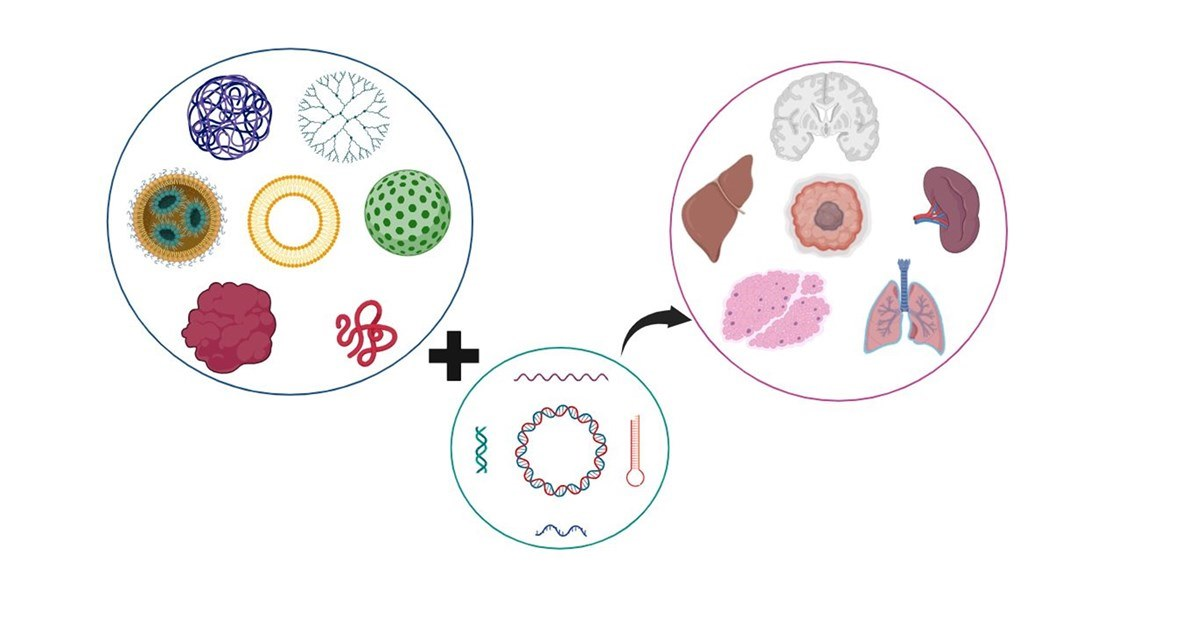Nanoparticle-Based Gene Delivery
A special issue of Pharmaceutics (ISSN 1999-4923). This special issue belongs to the section "Gene and Cell Therapy".
Deadline for manuscript submissions: 30 June 2025 | Viewed by 217

Special Issue Editors
Interests: drug delivery; gene delivery; nanomedicine; biomaterials
Special Issues, Collections and Topics in MDPI journals
Interests: drug delivery; gene delivery; nanomedicine; cancer research; biomaterials
Special Issues, Collections and Topics in MDPI journals
Special Issue Information
Dear Colleagues,
Gene therapy involves the introduction of exogenous genetic material into the cells in order to correct a specific inherited or acquired pathological condition. However, efficient delivery of the nucleic acids to the target cells is hampered by a number of extracellular and intracellular barriers which necessitates the use of a suitable gene delivery system. Over the last two decades, there has been a rapid increase in the development of gene therapy products and several new gene therapies have found their way to the market and/or received FDA approval such as Mipomersen (Kynamro®), Inotersen (Tegsedi®), patisiran (Onpattro®) and the mRNA based COVID and cancer vaccines. The fast growth of gene therapies is in part due to the introduction of various types of non-viral nanoparticle-based gene delivery systems most notably lipid-based and polymer-based systems. Compared to viral vectors, the nanoparticle based gene vectors are more versatile, safer (less immunogenic), easier to manufacture and scale up, and have much more potential for functionalization and targeting.
The focus of this issue of Pharmaceutics is novel nanoparticle-based gene delivery systems for highly efficient delivery of nucleic acid therapeutics to different organs and tissues. The scope of the issue covers every kind of nanoparticles made of polymers, lipids, peptides, proteins, metals, and hybrid systems for delivery of all kinds of therapeutic nucleic acids including pDNA, mRNA and oligonucleotides (ASOs, SSOs, siRNA, shRNA, miRNA).
Prof. Dr. Xiubo Zhao
Dr. Roja Hadianamrei
Guest Editors
Manuscript Submission Information
Manuscripts should be submitted online at www.mdpi.com by registering and logging in to this website. Once you are registered, click here to go to the submission form. Manuscripts can be submitted until the deadline. All submissions that pass pre-check are peer-reviewed. Accepted papers will be published continuously in the journal (as soon as accepted) and will be listed together on the special issue website. Research articles, review articles as well as short communications are invited. For planned papers, a title and short abstract (about 100 words) can be sent to the Editorial Office for announcement on this website.
Submitted manuscripts should not have been published previously, nor be under consideration for publication elsewhere (except conference proceedings papers). All manuscripts are thoroughly refereed through a single-blind peer-review process. A guide for authors and other relevant information for submission of manuscripts is available on the Instructions for Authors page. Pharmaceutics is an international peer-reviewed open access monthly journal published by MDPI.
Please visit the Instructions for Authors page before submitting a manuscript. The Article Processing Charge (APC) for publication in this open access journal is 2900 CHF (Swiss Francs). Submitted papers should be well formatted and use good English. Authors may use MDPI's English editing service prior to publication or during author revisions.
Keywords
- nanaoparticles
- gene delivery
- nucleic acids
- DNA
- RNA
- gene therapy
Benefits of Publishing in a Special Issue
- Ease of navigation: Grouping papers by topic helps scholars navigate broad scope journals more efficiently.
- Greater discoverability: Special Issues support the reach and impact of scientific research. Articles in Special Issues are more discoverable and cited more frequently.
- Expansion of research network: Special Issues facilitate connections among authors, fostering scientific collaborations.
- External promotion: Articles in Special Issues are often promoted through the journal's social media, increasing their visibility.
- e-Book format: Special Issues with more than 10 articles can be published as dedicated e-books, ensuring wide and rapid dissemination.
Further information on MDPI's Special Issue policies can be found here.







